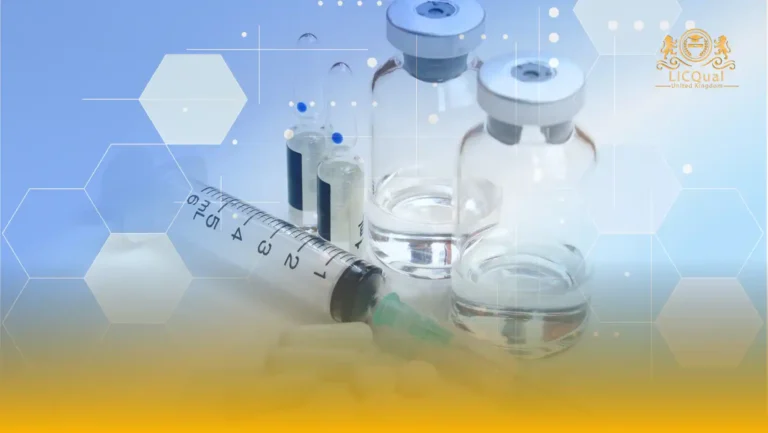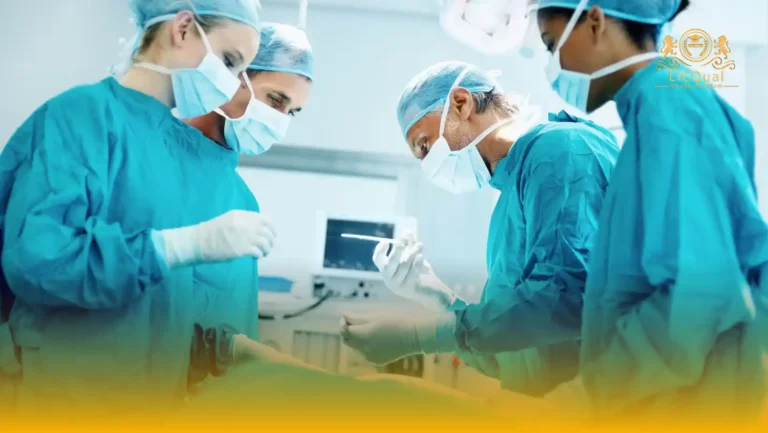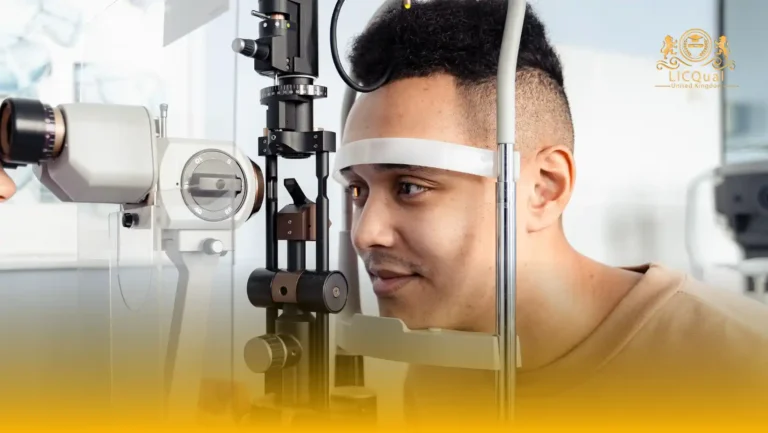The LICQual Level 7 Postgraduate Diploma in Allergy and Immunology (PgDAI) is a prestigious qualification designed to provide advanced knowledge and specialist skills in the diagnosis, management, and treatment of allergic and immunological disorders. This programme is not intended for fresh candidates but is aimed at experienced professionals who wish to enhance their career prospects, broaden their expertise, and strengthen their Continuing Professional Development (CPD).
Allergy and immunology are rapidly evolving fields that play a critical role in modern medicine. This diploma equips learners with the ability to understand complex immune mechanisms, identify a wide range of allergic conditions, and apply evidence-based approaches to clinical practice. The course combines theoretical knowledge with applied learning, ensuring that learners develop the competencies required to address both common and rare immunological challenges in diverse healthcare settings.
Centres delivering the LICQual Level 7 Postgraduate Diploma in Allergy and Immunology must ensure that teaching is provided by competent and highly qualified staff. They are also required to offer access to all necessary materials, clinical resources, and academic support to guarantee high-quality training and successful learner outcomes.
By undertaking this programme, learners will not only advance their expertise but also contribute to improved patient care and outcomes. This diploma serves as a pathway to senior professional roles, specialist clinical practice, and further academic or research opportunities in the field of allergy and immunology.
Course Overview
Qualification Title
LICQual Level 7 Postgraduate Diploma in Allergy and Immunology (PgDAI)
Total Units
6
Total Credits
120
GLH
600
Qualification #
LICQ2200990
Qualification Specification
To enroll in the LICQual Level 7 Postgraduate Diploma in Allergy and Immunology (PgDAI), applicants must meet the following criteria:
|
Qualification# |
Unit Title |
Credits |
GLH |
|---|---|---|---|
|
LICQ2200990-1 |
Advanced Principles of Immunology and Allergic Disorders |
20 |
100 |
|
LICQ2200990-2 |
Diagnostic Methods in Allergy and Immunology |
20 |
100 |
|
LICQ2200990-3 |
Management of Allergic Diseases and Immune Disorders |
20 |
100 |
|
LICQ2200990-4 |
Paediatric and Adult Allergy: Clinical Approaches |
20 |
100 |
|
LICQ2200990-5 |
Research Methods, Evidence-Based Practice, and Clinical Trials |
20 |
100 |
|
LICQ2200990-6 |
Public Health, Prevention, and Emerging Trends in Immunology |
20 |
100 |
By the end of this course, learners will be able to:
Unit 1: Advanced Principles of Allergy and Immunology
Learners will be able to:
- Critically analyse the immunological mechanisms underlying allergic reactions and immune system dysfunction.
- Evaluate the pathophysiology of hypersensitivity responses, immune tolerance, and inflammatory pathways.
- Demonstrate advanced understanding of genetic, epigenetic, and environmental factors influencing immune-mediated conditions.
- Apply theoretical knowledge to predict disease outcomes and clinical manifestations.
Unit 2: Diagnostic Methods and Laboratory Investigations in Allergy and Immunology
Learners will be able to:
- Apply advanced diagnostic techniques, including skin testing, serology, molecular testing, and flow cytometry.
- Critically interpret laboratory data for accurate diagnosis of allergic and immunological conditions.
- Assess the role of biomarkers and novel diagnostic tools in improving clinical outcomes.
- Integrate diagnostic findings with patient history and physical examination for comprehensive assessment.
Unit 3: Clinical Management of Allergic Disorders
Learners will be able to:
- Evaluate and implement evidence-based treatment strategies for common and complex allergic conditions (e.g., asthma, food allergy, anaphylaxis, drug allergy).
- Critically assess the role of immunotherapy and biologics in patient care.
- Develop patient-centred management plans, incorporating lifestyle, environmental, and pharmacological interventions.
- Appraise the impact of multidisciplinary care and patient education in improving outcomes.
Unit 4: Autoimmune and Immunodeficiency Disorders
Learners will be able to:
- Analyse the immunological mechanisms driving autoimmune and primary/secondary immunodeficiency disorders.
- Evaluate diagnostic approaches and treatment protocols for conditions such as lupus, rheumatoid arthritis, and CVID.
- Critically appraise recent developments in immunomodulatory therapies and transplantation immunology.
- Formulate effective management plans addressing both clinical and psychosocial aspects of long-term care.
Unit 5: Research, Evidence-Based Practice, and Clinical Innovation
Learners will be able to:
- Critically review current research and literature in allergy and immunology to inform practice.
- Design and evaluate research methodologies relevant to clinical and laboratory studies.
- Apply evidence-based practice principles in complex clinical decision-making.
- Demonstrate innovation in developing new approaches for diagnosis, treatment, or prevention of allergic and immunological disorders.
Unit 6: Public Health, Prevention, and Global Perspectives in Allergy and Immunology
Learners will be able to:
- Evaluate the epidemiology and global burden of allergic and immunological diseases.
- Assess public health strategies for prevention, early detection, and management of immune-related conditions.
- Critically appraise health policy frameworks, global guidelines, and advocacy initiatives.
- Formulate effective awareness, prevention, and intervention programmes within diverse healthcare systems.
The LICQual Level 7 Postgraduate Diploma in Allergy and Immunology (PgDAI) is designed for healthcare professionals, clinicians, and medical practitioners aiming to specialize in allergy and immune system disorders. This Level 7 qualification is perfect for those seeking internationally recognized credentials, practical skills in advanced allergy management, and expertise in immunology. Whether you work in hospitals, private clinics, research institutions, or public health settings, this diploma equips you with the knowledge and credibility to excel in allergy and immunology practice.
Allergists and Immunologists
- Designed for professionals specializing in allergic and immune system disorders.
- Enhances skills in immunotherapy and advanced diagnostic techniques.
- Builds expertise in asthma, atopic diseases, and autoimmune conditions.
- Strengthens evidence-based clinical decision-making.
- Provides internationally recognized credentials for career advancement.
Doctors and General Practitioners
- Ideal for general practitioners looking to specialize in allergy and immunology.
- Improves knowledge of patient assessment and immune system evaluation.
- Enhances treatment planning and preventive care strategies.
- Builds confidence in managing complex allergic and immunological conditions.
- Supports professional growth in hospitals, clinics, and private practice.
Nurses and Allied Health Professionals
- Tailored for nurses, clinical practitioners, and allied health staff.
- Enhances patient monitoring and care in allergy and immunology settings.
- Builds practical skills in immunotherapy administration and patient counseling.
- Develops understanding of ethical, legal, and professional standards.
- Supports continuing professional development (CPD) and clinical competency.
Medical Students and Postgraduate Trainees
- Suitable for graduates pursuing specialization in allergy and immunology.
- Provides strong foundational knowledge in immune system disorders.
- Enhances clinical reasoning, research, and treatment planning skills.
- Prepares learners for postgraduate training or advanced clinical practice.
- Offers internationally recognized certification to boost career prospects.
Public Health and Research Professionals
- Designed for professionals working in epidemiology, global health, or research.
- Enhances skills in allergy surveillance and immunology research.
- Builds knowledge in public health strategies for immune-related conditions.
- Promotes evidence-based approaches to disease prevention and management.
- Supports academic publication and career growth in research settings.
Hospital and Clinic Practitioners
- Ideal for clinicians working in hospitals or private clinics.
- Enhances patient consultation and advanced allergy management expertise.
- Builds proficiency in immunotherapy, diagnostics, and treatment planning.
- Encourages application of best practices in clinical settings.
- Supports professional credibility and career progression in allergy and immunology.
International Healthcare Professionals
- Perfect for global learners seeking UK-recognized allergy and immunology training.
- Offers flexible online learning to balance work and study commitments.
- Equips learners with skills applicable in international healthcare settings.
- Builds credibility in global allergy and immunology networks.
- Supports career growth and international professional opportunities.
Centres delivering the LICQual Level 7 Postgraduate Diploma in Allergy and Immunology (PgDAI) must meet the highest international academic and professional standards to ensure effective learner development and successful outcomes. The following requirements are essential:
- Qualified Faculty: Centres must employ competent, experienced, and professionally qualified staff with expertise in allergy, immunology, and advanced medical sciences.
- Learning Resources: Access to up-to-date textbooks, peer-reviewed journals, case studies, and digital platforms to support independent and guided study.
- Laboratory and Clinical Facilities: Centres should provide learners with access to appropriate laboratory environments, clinical case studies, or simulation-based resources to strengthen applied knowledge.
- Assessment Systems: Robust assessment policies and practices must be in place to evaluate learner knowledge, practical skills, and critical thinking effectively.
- Quality Assurance: Centres must implement strong internal quality assurance systems to maintain consistency, reliability, and academic excellence.
- Technological Infrastructure: Availability of e-learning platforms, virtual classrooms, and digital tools for blended and flexible learning delivery.
- Support Services: Learners must have access to academic support, mentoring, and CPD guidance throughout the course.
- Compliance with LICQual Standards: Centres must adhere to LICQual regulations and ensure delivery aligns with international benchmarks for postgraduate education.
Assessment and Verification
All units within this qualification are subject to internal assessment by the approved centre and external verification by LICQual. The qualification follows a criterion-referenced assessment approach, ensuring that learners meet all specified learning outcomes.
To achieve a ‘Pass’ in any unit, learners must provide valid, sufficient, and authentic evidence demonstrating their attainment of all learning outcomes and compliance with the prescribed assessment criteria. The Assessor is responsible for evaluating the evidence and determining whether the learner has successfully met the required standards.
Assessors must maintain a clear and comprehensive audit trail, documenting the basis for their assessment decisions to ensure transparency, consistency, and compliance with quality assurance requirements.







